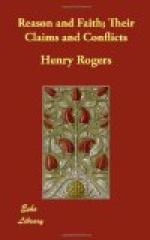We have enumerated some of the paradoxes which infidelity is required to believe; and the old-fashioned, open, intelligible infidelity of the last century accepted them, and rejected Christianity accordingly. That was a self-consistent, simple, Ingenuous thing, compared with those monstrous forms of credulous reason, incredulous faith, metaphysical mysticism, even Christian Pantheism—so many varieties of which have sprung out of the incubation of German rationalism and German philosophy upon the New Testament. The advocates of these systems, after adopting the most formidable of the above paradoxes of infidelity, and (notwithstanding the frequent boast of originality) depending mainly on the same objections, and defending them by the very same critical arguments*, delude themselves with the idea that they have but purified and embalmed Christianity; not aware that they have first made a mummy of it. They are so greedy of paradox, that they, in fact, aspire to be Christians and infidels at the same time. Proclaiming the miracles of Christianity to be illusions of imagination or mythical legends,—the inspiration of its records no other or greater than that of Homer’s ‘Iliad,’ or even ’Aesop’s Fables;’—rejecting the whole of that supernatural clement with which the only records which can tell us any thing about the matter are full; declaring its whole history so uncertain that the ratio of truth to error must be a vanishing fraction;—the advocates of these systems yet proceed to rant and rave—they are really the only words we know which can express our sense of their absurdity—in a most edifying vein about the divinity of Christianity, and to reveal to us its true glories. ‘Christ,’ says Strauss, ’is not an individual, but an idea; that is to say, humanity. In the human race behold the God-made-man! behold the child of the visible virgin and the invisible Father!—that is, of matter and of mind; behold the Saviour, the Redeemer, the Sinless One; behold him who dies, who is raised again, who mounts into the heavens I Believe in this Christ! In his death, his resurrection, man is justified before God!’+




